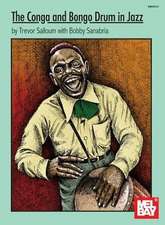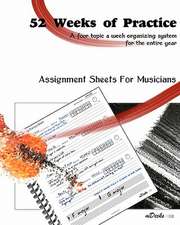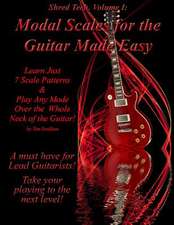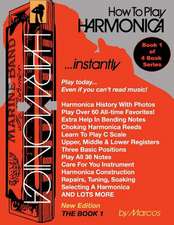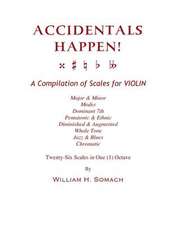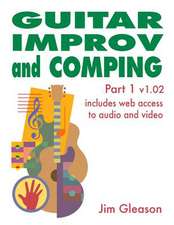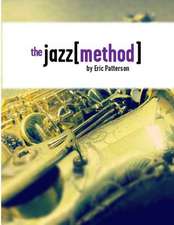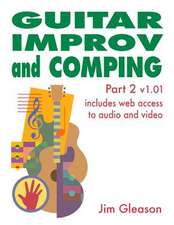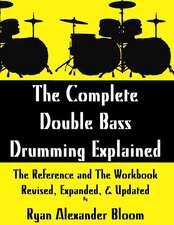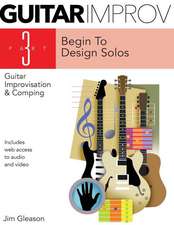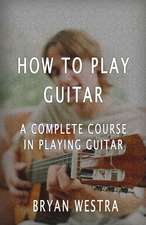Looking for the Perfect Beat: The Art and Culture of the DJ
Autor Kurt B. Reighleyen Limba Engleză Paperback – 31 ian 2000
-- DJ Q-Bert
They are music's vanguard. The reshape today's sounds -- house, techno, hip-hop, rock -- direct our feet on the floor, and influence the way music is represented in our culture.
"Don't look at the turntable as just this mechanism that you play records on. Apply yourself to it as if it were an instrument, and you can express yourself through the turntable."
-- Rob Swift, The X-ecutioners
From the rapid-fire editing of MTV videos, to underground parties and world-famous clubs, DJs have altered the course of music and video, moved into new media, and turned our generation on its ear -- literally.
Meet these creative artists -- many of them celebrities in their own right -- who line up the most infectious beats, mix and program them, and make us dance talk and think about music -- and the world -- in entirely different ways.
"We like to mix it all up and have a good time, a bit of a laugh."
-- Ben Dubuisson, Purple Penguin
Discover how they select their gear and choose tunes -- and pick up tips on how to mix.
Preț: 107.09 lei
Nou
Puncte Express: 161
Preț estimativ în valută:
20.50€ • 21.12$ • 17.30£
20.50€ • 21.12$ • 17.30£
Carte disponibilă
Livrare economică 08-22 februarie
Preluare comenzi: 021 569.72.76
Specificații
ISBN-13: 9780671038694
ISBN-10: 0671038699
Pagini: 256
Dimensiuni: 156 x 232 x 23 mm
Greutate: 0.36 kg
Ediția:Original
Editura: MTV Books
Colecția MTV Books
ISBN-10: 0671038699
Pagini: 256
Dimensiuni: 156 x 232 x 23 mm
Greutate: 0.36 kg
Ediția:Original
Editura: MTV Books
Colecția MTV Books
Notă biografică
Kurt B. Reighley is editor at large for CMJ New Music Monthly and the author of the biography Marilyn Manson. His writing has appeared in Details, Rolling Stone, Interview, Out, and Paper, and he is a regular columnist for Seattle Weekly. As DJ El Toro, he can be found torturing turntables at a variety of Seattle-area watering holes.
Extras
Chapter 1: What is a DJ?
What is a DJ?
A fairly simple question. Not so long ago, the answer was just as succinct. A DJ -- an abbreviation for the slang term disc jockey -- was an individual who entertained an audience by playing prerecorded music. That definition, originally ascribed to practitioners on radio, and later at social functions and watering holes, still holds true.
More than half a century later, this tiny abbreviation invites countless interpretations, and they keep multiplying exponentially. DJs are celebrities, drawing crowds of dancers in the thousands, breaking world records for attendance. DJs are musicians, virtuosos who elevate turntables far beyond mere mechanisms for playing back vinyl LPs, integral members of chart-topping bands, seasoned nightlife veterans filtering underground trends into Top 40 hits. DJs are modern-day shamans. And they're salespeople, too.
DJs dictate what the people will listen to, dance to, and buy. We are the biggest promotion an artist can have. It's very rare for a radio station to take a record out of the box and put it on the air, unless it's an established artist. You can have a bona fide hit from a new artist, but radio won't touch it until it's already a hit in the streets. And that comes from the DJs.
-- DJ Skribble
But DJs also function as artists, educators, historians, and diplomats. They are constantly arranging and interpreting the multimedia stimuli that surround us. Via calculated juxtaposition of musical (and today, visual) materials, they influence social trends and provoke alternate ways of thinking, conducting business, or experiencing daily life. Their eclectic, mercurial collages embody our multitasking modern mind-set. And DJ techniques and aesthetics continue to infiltrate and shape other media: software, live performance, and even writing.
My parents once said, "Oh, a DJ...that's somebody who plays records." But my first priority is to be a musician, who seriously puts a lot of ideas together in a creative way. That's what really defines DJing.
-- Alec Empire
DJs have existed on radio since after the turn of the twentieth century. On Christmas Eve 1906, pioneering electrical engineer Reginald A. Fessenden broadcast a holiday program that included a Handel recording. As the medium grew in popularity, so did the role of the DJ, as entertainer, spokesperson, and -- most important -- a conduit for new music. With the advent of nightclubs and discotheques, additional platforms for DJs emerged.
The historical epicenter of the DJ movement as it exists in its myriad forms today is New York City in the mid-'70s. During this era, two concurrent musical trends -- rap and disco -- radically redefined notions of a DJ's duties while slowly increasing DJs' cachet as artists and entertainers.
In the Bronx, rap innovators like Kool DJ Herc, Afrika Bambaataa, and Grandmaster Flash expanded the musical abilities of two turntables and a mixer. Cutting back and forth between isolated snippets of sound with lightning-fast dexterity and physically manipulating the surface of the record against the needle to generate unfamiliar bursts of noise, they transformed slabs of vinyl into fresh creations. Meanwhile, at Manhattan discos, club jocks like Francis Grasso created inspired programs of interlocking songs and even began simultaneously layering passages from different records.
A whole new venue for entertainment was created, with the disc jockey, the dancers, and the turntables. Instead of having a [musical] group performing, you were playing a recording. The disc jockey segued the music. And the dancing became part of the performance.
-- David Mancuso
Subsequent trends around the globe added new dimensions to the art of the DJ. The Chicago house movement of the '80s advanced ideas of how a DJ could interface prerecorded music and additional sound generators to yield new compositions. Detroit's techno scene fostered unexpected common ground between diverse genres (funk, New York disco, European synthesizer pop) and deliberately altered records via pronounced changes in frequency levels, pitch, and speed.
In Europe, the melting-pot style that began life as Balearic on the Spanish isle of Ibiza opened up the dance floor to include an almost unimaginable variety of genres. Imported to England a few years later, it soon folded house and techno into the mix and snowballed into the 1988 Summer of Love, an explosion of music, clubs, and outdoor parties that has made dance music and pop music synonymous in Europe ever since. From these roots, the harder-edged sounds of hardcore techno, jungle, and drum and bass later emerged.
As DJs have risen in prominence internationally, the worlds of music and entertainment have changed to co-opt their talents and accommodate their needs. New formats like the twelve-inch single allowed DJs to play longer versions of songs their crowd loved, which in turn meant wider exposure and opportunities for increased sales. Inventions like record pools and exclusive promotional pressings made music available to influential DJs early, creating alternate feedback mechanisms for record companies to gauge commercial viability. Manufacturers of musical equipment began designing gear with the special needs of DJs in mind, prompting a wider range of turntables and mixers. Savvy club owners may even go so far as to customize sound systems or DJ booths to meet the specifications of men and women who work the wheels of steel in their venue.
In the '60s, you had Jimi Hendrix. Now it's the '90s, and the turntable is the new instrument. The DJ is the guitar god for the new millennium.
-- DJ Lethal
The market's completely shifted in Europe. There was an article in one of the major music publications recently saying that turntables are outselling guitars three to one.
-- Paul Oakenfold
TV commercials and print ads use images of DJs to hawk products, from soda pop to sneakers to cigarettes. At a certain southern California university, students can study "How to DJ" for college credit. Even the stodgy National Academy of Recording Arts and Sciences finally buckled a few years ago and gave DJs the nod by introducing the Grammy Award for Best Remix. With such a variety of enticements, plus an increasing number of avenues of entry, sometimes it feels like everybody wants to be a DJ.
The mainstream is seeing what we do more and more. That's opening doors at corporations, opening up other media to DJs.
-- DJ Skribble
But the rise of the DJ also reflects a fundamental shift in daily life that transcends music. Considering how much information the average person is bombarded with constantly via mass media, there is more than a little bit of the DJ in all of us, filtering, processing, and fashioning this potential overload into some semblance of useful order.
DJ culture is one of the most easily translated codes going on in music right now. You drop a needle on a certain beat and people will be able to respond, whether they're in Buenos Aires, Tel Aviv, or St. Petersburg.
-- DJ Spooky
The thirty-eight DJs surveyed for this book span a vast gamut. From a sage fifty-four-year-old bastion of New York underground disco to a smart-mouthed Chicago peddler of earsplitting, hyperfast hardcore techno, they all have roots in one or more of the aforementioned scenes. They are men and women, representing a variety of racial, sexual, and economic backgrounds; playing a broad spectrum of sounds; and pushing their discipline in countless new directions: internet media, visual art, criticism, software design.
The DJ culture is very big now. You'll have the badass DJs and the politicians, the Michael Jordans of DJs. All those kinds of roles are going to happen. The image of DJ culture should always be diverse.
-- DJ Soul Slinger
Music is always a metaphor for something else. It isn't just some sounds coming out of your loudspeakers. Most people in our generation involved with DJ culture are coming at it from the art world or graphic design or some sort of computer-literate vibe.
-- DJ Spooky
The guiding logic behind selecting a wide range of participants was twofold: first, to show the full historical and cultural scope of the art of the DJ and second, to divine what traits and practices even seemingly disparate DJs share in common. Sometimes, being a superlative DJ hinges on the ability to make enlightened connections where none are readily apparent. Like any artistic discipline, DJing is deceptively simple to pick up, challenging to master, and constantly being altered and augmented by new generations.
A myriad of discussions address concerns both aesthetic and technical in the chapters that follow: the finer details of mixing; how to program a set and communicate with a crowd; and how DJs have changed the way we make, hear, and think about music. To varying degrees, all these concerns factor into the art of any DJ.
The most important thing all the participants of Looking for the Perfect Beat have in common is what motivated them to tackle their craft: a deep love for music and a desire to share it with others.
DJing is a drug. There is no other thing where you can fail so easily. You can be rockin' a crowd and then suddenly clear the floor. And it's all down to you. That's what gives it the edge.
-- Ben Dubuisson (Purple Penguin)
Copyright © 2000 by Kurt B. Reighley
What is a DJ?
A fairly simple question. Not so long ago, the answer was just as succinct. A DJ -- an abbreviation for the slang term disc jockey -- was an individual who entertained an audience by playing prerecorded music. That definition, originally ascribed to practitioners on radio, and later at social functions and watering holes, still holds true.
More than half a century later, this tiny abbreviation invites countless interpretations, and they keep multiplying exponentially. DJs are celebrities, drawing crowds of dancers in the thousands, breaking world records for attendance. DJs are musicians, virtuosos who elevate turntables far beyond mere mechanisms for playing back vinyl LPs, integral members of chart-topping bands, seasoned nightlife veterans filtering underground trends into Top 40 hits. DJs are modern-day shamans. And they're salespeople, too.
DJs dictate what the people will listen to, dance to, and buy. We are the biggest promotion an artist can have. It's very rare for a radio station to take a record out of the box and put it on the air, unless it's an established artist. You can have a bona fide hit from a new artist, but radio won't touch it until it's already a hit in the streets. And that comes from the DJs.
-- DJ Skribble
But DJs also function as artists, educators, historians, and diplomats. They are constantly arranging and interpreting the multimedia stimuli that surround us. Via calculated juxtaposition of musical (and today, visual) materials, they influence social trends and provoke alternate ways of thinking, conducting business, or experiencing daily life. Their eclectic, mercurial collages embody our multitasking modern mind-set. And DJ techniques and aesthetics continue to infiltrate and shape other media: software, live performance, and even writing.
My parents once said, "Oh, a DJ...that's somebody who plays records." But my first priority is to be a musician, who seriously puts a lot of ideas together in a creative way. That's what really defines DJing.
-- Alec Empire
DJs have existed on radio since after the turn of the twentieth century. On Christmas Eve 1906, pioneering electrical engineer Reginald A. Fessenden broadcast a holiday program that included a Handel recording. As the medium grew in popularity, so did the role of the DJ, as entertainer, spokesperson, and -- most important -- a conduit for new music. With the advent of nightclubs and discotheques, additional platforms for DJs emerged.
The historical epicenter of the DJ movement as it exists in its myriad forms today is New York City in the mid-'70s. During this era, two concurrent musical trends -- rap and disco -- radically redefined notions of a DJ's duties while slowly increasing DJs' cachet as artists and entertainers.
In the Bronx, rap innovators like Kool DJ Herc, Afrika Bambaataa, and Grandmaster Flash expanded the musical abilities of two turntables and a mixer. Cutting back and forth between isolated snippets of sound with lightning-fast dexterity and physically manipulating the surface of the record against the needle to generate unfamiliar bursts of noise, they transformed slabs of vinyl into fresh creations. Meanwhile, at Manhattan discos, club jocks like Francis Grasso created inspired programs of interlocking songs and even began simultaneously layering passages from different records.
A whole new venue for entertainment was created, with the disc jockey, the dancers, and the turntables. Instead of having a [musical] group performing, you were playing a recording. The disc jockey segued the music. And the dancing became part of the performance.
-- David Mancuso
Subsequent trends around the globe added new dimensions to the art of the DJ. The Chicago house movement of the '80s advanced ideas of how a DJ could interface prerecorded music and additional sound generators to yield new compositions. Detroit's techno scene fostered unexpected common ground between diverse genres (funk, New York disco, European synthesizer pop) and deliberately altered records via pronounced changes in frequency levels, pitch, and speed.
In Europe, the melting-pot style that began life as Balearic on the Spanish isle of Ibiza opened up the dance floor to include an almost unimaginable variety of genres. Imported to England a few years later, it soon folded house and techno into the mix and snowballed into the 1988 Summer of Love, an explosion of music, clubs, and outdoor parties that has made dance music and pop music synonymous in Europe ever since. From these roots, the harder-edged sounds of hardcore techno, jungle, and drum and bass later emerged.
As DJs have risen in prominence internationally, the worlds of music and entertainment have changed to co-opt their talents and accommodate their needs. New formats like the twelve-inch single allowed DJs to play longer versions of songs their crowd loved, which in turn meant wider exposure and opportunities for increased sales. Inventions like record pools and exclusive promotional pressings made music available to influential DJs early, creating alternate feedback mechanisms for record companies to gauge commercial viability. Manufacturers of musical equipment began designing gear with the special needs of DJs in mind, prompting a wider range of turntables and mixers. Savvy club owners may even go so far as to customize sound systems or DJ booths to meet the specifications of men and women who work the wheels of steel in their venue.
In the '60s, you had Jimi Hendrix. Now it's the '90s, and the turntable is the new instrument. The DJ is the guitar god for the new millennium.
-- DJ Lethal
The market's completely shifted in Europe. There was an article in one of the major music publications recently saying that turntables are outselling guitars three to one.
-- Paul Oakenfold
TV commercials and print ads use images of DJs to hawk products, from soda pop to sneakers to cigarettes. At a certain southern California university, students can study "How to DJ" for college credit. Even the stodgy National Academy of Recording Arts and Sciences finally buckled a few years ago and gave DJs the nod by introducing the Grammy Award for Best Remix. With such a variety of enticements, plus an increasing number of avenues of entry, sometimes it feels like everybody wants to be a DJ.
The mainstream is seeing what we do more and more. That's opening doors at corporations, opening up other media to DJs.
-- DJ Skribble
But the rise of the DJ also reflects a fundamental shift in daily life that transcends music. Considering how much information the average person is bombarded with constantly via mass media, there is more than a little bit of the DJ in all of us, filtering, processing, and fashioning this potential overload into some semblance of useful order.
DJ culture is one of the most easily translated codes going on in music right now. You drop a needle on a certain beat and people will be able to respond, whether they're in Buenos Aires, Tel Aviv, or St. Petersburg.
-- DJ Spooky
The thirty-eight DJs surveyed for this book span a vast gamut. From a sage fifty-four-year-old bastion of New York underground disco to a smart-mouthed Chicago peddler of earsplitting, hyperfast hardcore techno, they all have roots in one or more of the aforementioned scenes. They are men and women, representing a variety of racial, sexual, and economic backgrounds; playing a broad spectrum of sounds; and pushing their discipline in countless new directions: internet media, visual art, criticism, software design.
The DJ culture is very big now. You'll have the badass DJs and the politicians, the Michael Jordans of DJs. All those kinds of roles are going to happen. The image of DJ culture should always be diverse.
-- DJ Soul Slinger
Music is always a metaphor for something else. It isn't just some sounds coming out of your loudspeakers. Most people in our generation involved with DJ culture are coming at it from the art world or graphic design or some sort of computer-literate vibe.
-- DJ Spooky
The guiding logic behind selecting a wide range of participants was twofold: first, to show the full historical and cultural scope of the art of the DJ and second, to divine what traits and practices even seemingly disparate DJs share in common. Sometimes, being a superlative DJ hinges on the ability to make enlightened connections where none are readily apparent. Like any artistic discipline, DJing is deceptively simple to pick up, challenging to master, and constantly being altered and augmented by new generations.
A myriad of discussions address concerns both aesthetic and technical in the chapters that follow: the finer details of mixing; how to program a set and communicate with a crowd; and how DJs have changed the way we make, hear, and think about music. To varying degrees, all these concerns factor into the art of any DJ.
The most important thing all the participants of Looking for the Perfect Beat have in common is what motivated them to tackle their craft: a deep love for music and a desire to share it with others.
DJing is a drug. There is no other thing where you can fail so easily. You can be rockin' a crowd and then suddenly clear the floor. And it's all down to you. That's what gives it the edge.
-- Ben Dubuisson (Purple Penguin)
Copyright © 2000 by Kurt B. Reighley
Cuprins
Contents
Preface
Introduction: Who Do You Think You Are?
I What Is a DJ?
2 Got to Be Real
3 Dance to the Drummer's Beat
4 The Young Person's Guide to Gear
5 Looking for the Perfect Beat
6 It Takes Two
7 Let the Music Play
8 The Good, the Bad, and the Ugly
9 All That Scratchin'
10 The Music That We Make
11 Stars
12 The Future of the Future
Bibliography
Descriere
An electrifying, behind-the-scenes glimpse into the pulse-pounding world of DJ culture--profiling the rise of the DJ as a musical icon.

